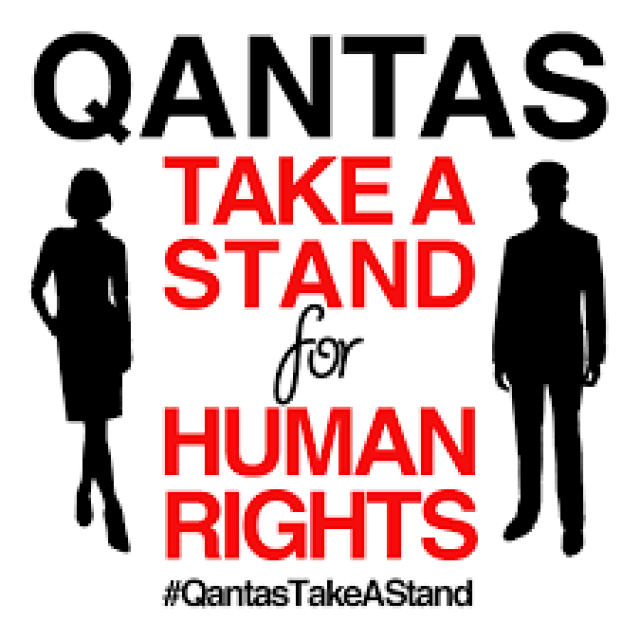
Refugee activists are stepping up pressure on Qantas to halt its participation in the deportation of refugees from Australia, hoping this will help increase pressure on other airlines to follow suit.
Protests are planned outside Qantas offices in Sydney and Melbourne and a campaign has been launched to petition Qantas and 11 other airlines not to let the Australian government use their aircraft, pilots or crew to deport a Tamil family back to danger in Sri Lanka.
Activists are also raising funds for a billboard in the local electorate of the Minister for Home Affairs Minister Peter Dutton, calling on him to intervene to stop the deportation.
In March, Border Force took Priya, her husband Nades and their two Australian-born daughters from their home in the central Queensland town of Biloela in a dawn raid. For the past five months, the family has been held in a Melbourne detention centre.
The Australian government has continued to deport Tamil refugees to Sri Lanka, in spite of the dangers of harassment, imprisonment, torture and disappearance many face. According to the Tamil Refugee Council, there are about 1300 Tamils currently facing deportation from Australia after being refused protection visas.
In 2017 Qantas released its Modern Slavery and Human Trafficking Statement. It claimed they are committed to aligning their business with the United Nations Guiding Principles on Business and Human Rights (UNGPs).
The UNGPs outline in detail the responsibility of corporations to respect human rights and to: “Avoid causing or contributing to adverse human rights impacts through their own activities, and address such impacts when they occur”. Corporations should also: “Seek to prevent or mitigate adverse human rights impacts that are directly linked to their operations, products or services by their business relationships, even if they have not contributed to those impacts”.
The UNGPs also state that businesses should: “Comply with all applicable laws and respect internationally recognised human rights, wherever they operate; seek ways to honour the principles of internationally recognised human rights when faced with conflicting requirements; and treat the risk of causing or contributing to gross human rights abuses as a legal compliance issue wherever they operate.”
The Qantas Code of Conduct and Ethics states that “Qantas employees, including directors, agents, contractors and others who represent our business, must respect and support human rights.”
But will Qantas be prepared to put human rights and refugees’ lives ahead of corporate profits and government contracts? It will take a concerted campaign by refugee rights activists, in alliance with trade unions, to force Qantas to turn their words into action.
A win for this campaign would not only help protect the safety of Priya, Nades and their children, but would strike a blow against the federal government’s cruel and inhumane policy. With the government under increasing pressure, there should be no let-up in the campaign.
While the international situation for refugees is grim, human rights campaigns can and have had their wins — and we should celebrate them.
The recent announcement by Virgin Atlantic in Britain that from August 1 they will no longer assist in the deportation of refugees by the British government followed a successful campaign by LGBTI and refugee rights activists. Activists are now calling on British Airways to follow suit.
In June, US airlines American, Frontier, Southwest and United each refused to fly immigrant children who had been separated from their parents on behalf of the US government, following the backlash against President Donald Trump’s inhumane policy toward migrants.
In January, a number of pilots working for Israel's national airline El Al announced they would not take part in the deportations of Eritrean and Sudanese asylum seekers, following the passage of a bill in the Israeli parliament to indefinitely detain asylum seekers or deport them.
Pilots across Germany halted 222 deportation flights in 2017. Pilots from German airlines Lufthansa and Eurowings halted at least 85 flights in the first eight months of this year.
But such victories will only be temporary as long as governments, including our own, maintain cruel and inhumane laws that criminalise asylum seekers.
In the face of the European refugee crisis, country after country across the European Union has tightened its borders. In Sweden — once a welcoming destination for refugees from across the globe — the government has reversed its “open-door” refugee policy. The reversal happened in 2015 at the height of the crisis.
The Swedish government’s policy about-face came to international attention in July, after the heroic action by Swedish student Elin Ersson to stop the deportation of a refugee to Afghanistan. Ersson refused to take her seat knowing that a 52-year-old refugee was being deported on her flight from Gothenburg. Ersson’s protest gained support from other passengers and the refugee was removed from the plane. But the Swedish government’s tough deportation laws remain in place — for now — and the campaign continues.
In the words of refugee campaigners from Gothenburg: "What this story shows is that only one person is needed to spark action but many are needed to make a change."
[Join the protests on August 9. The Sydney protest is at 12.30 outside Qantas Australia Head Office, 10-12 Bourke Rd, Mascot and the Melbourne protest is at 4pm outside Jetstar’s corporate office, 79-81 Victoria Pde, Collingwood.]